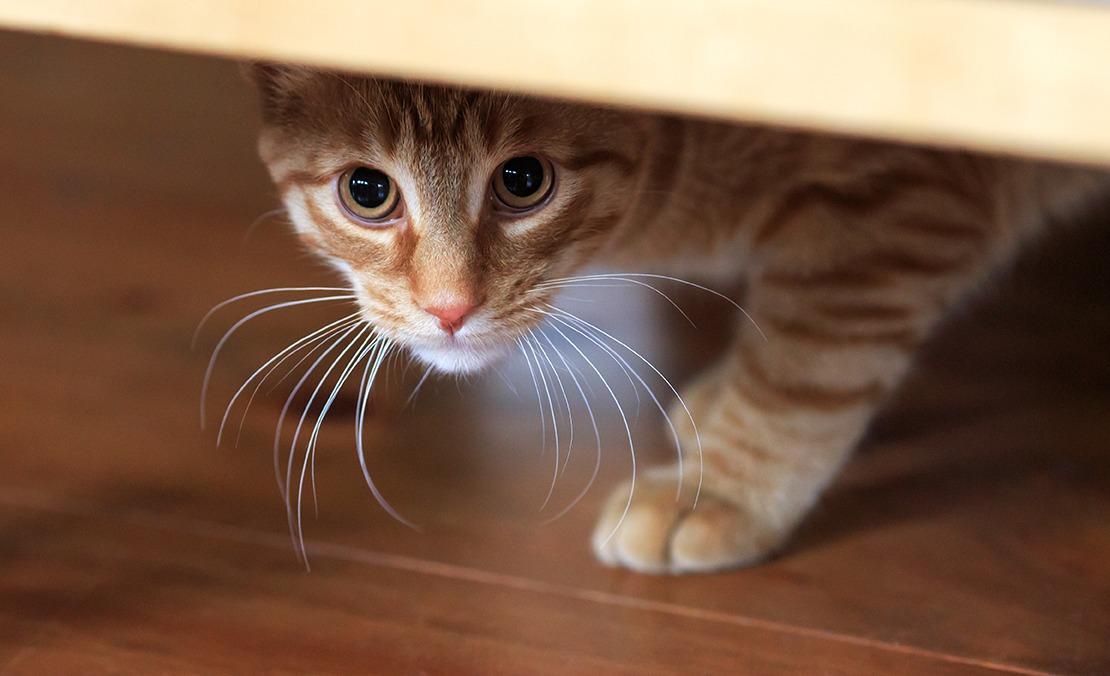By nature, cats are very secretive, so it can be tricky to tell when they’re feeling a bit down in the dumps.

Just like humans, cats can be sensitive creatures and may become anxious or stressed by environmental factors, such as the way people interact with them. Here is our expert advice on how to reduce signs of stress in cats.
Types of stress in cats
All cats are different, and some will be generally more relaxed than others. Anxiety in cats can come from both environmental and genetic factors.
There are two types of stress that may affect your cat:
Acute stress
Acute stress in cats is relatively easy to recognise. It’s often caused by a situation the animal perceives to be threatening, such as a trip to the vets.
Symptoms of acute stress include:
- Crouching and not moving
- Holding the tail close to the body
- Wide eyes with dilated pupils
- Ears flattened to the head
- Yowling or growling
- Drooling
- Involuntary urination or defecation
- Aggression
Chronic stress
This is more difficult to detect and tends to develop over a longer period of time, and can often lead to behavioural or medical problems. It can occur because of a cat’s interaction with its environment, with other cats, or also with its owner.
Symptoms of chronic stress include:
- Hiding under or behind furniture
- Soiling or wetting in the house
- Spending more time hiding or resting than interacting
- Refusing to eat, groom, or use the litter tray
- Defensive aggression
- Excessive grooming, particularly of the tummy area
- Jumping at small noises
Causes of stress
Like humans, cats are individual and unique, so while there are some common causes for their stress, there is no limit to the potential triggers.
Some examples of common stress triggers are:
- Loud noises, such as fireworks and thunderstorms
- The addition of a new pet to the family
- Moving home
- Changes to routine or schedule
- Flea infestations
- Boredom
- Car journeys
- Being left home alone
- Remodelling or furniture arrangement
- Limits in resources such as food, litter, water
How stress affects the health of cats
Not only does stress affect a cat’s mental health, but also their physical wellbeing, too. Veterinary research studies have shown that stress can make otherwise healthy cats vomit, urinate or defecate away from the litter box and have little energy and/or appetite.
Some cats can even develop urinary tract diseases, such as feline idiopathic cystitis, as a direct response to stress. The signs of urinary tract diseases include straining to urinate, bloody or discoloured urine, frequent urination and in more severe cases, the inability to urinate. If your cat is showing any of these signs, it’s important that they see a vet as soon as possible.
Creating a stress-free home
Make sure other cats can’t get through the cat flap. Cats are very territorial and another cat encroaching on their territory and eating their food can be very stressful. If this is an issue, think about using a microchip-activated cat flap, or remove the cat flap altogether.
Cats can be notoriously fussy about water – some don’t like the smell of chlorine in tap water, and some will only drink directly from the tap. Try experimenting with different bowls and locations to see what your cat prefers. If your cat likes water from the tap, try purchasing a pet water fountain, alternatively, you could try bottled water or keep a bowl outside that can collect the rain.
Cats can also be fussy about the bowl they eat from – some won’t eat out of plastic bowls, as they don’t like the smell. Others will only eat out of a metal bowl. Again, experiment with different bowls to find out what your cat prefers.
Make sure you don’t place a cat’s food near their litter tray – they don’t like eating where they poop – who can blame them?!
Make sure your cat has access to high level resting places, if they’re old and arthritic, make sure they are able to get up and down safely and easily. Experiment with cardboard boxes or a cat bed in different places and see where your cat prefers to go.
Litter trays should be placed in a discreet corner, away from busy thoroughfares, food, and water. As a general rule, you should provide one litter tray per cat, and one extra in a different location. It’s also important to make sure they’re cleaned every day.
Provide your cat with a scratching post. Since most cats like to stand on their hind legs to scratch, the post should be nice and tall.
House cats should be provided with different stimuli every now and then, otherwise, life may become a little dull. Alternating toys and cardboard boxes, and even providing some kitty grass, can help. Make an effort to allow for regular quality time together.
Cats like routines. Try and keep their environment as familiar and predictable as possible to reduce your cat’s stress.

